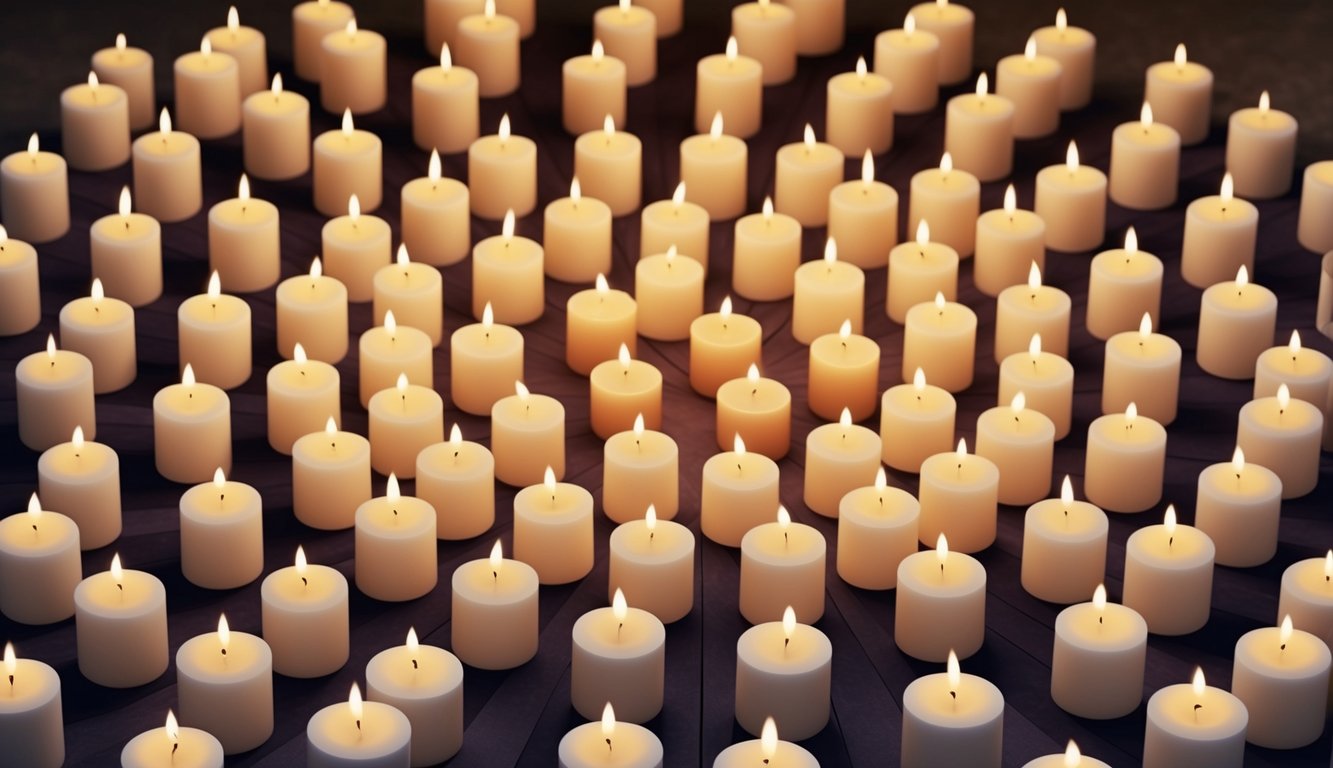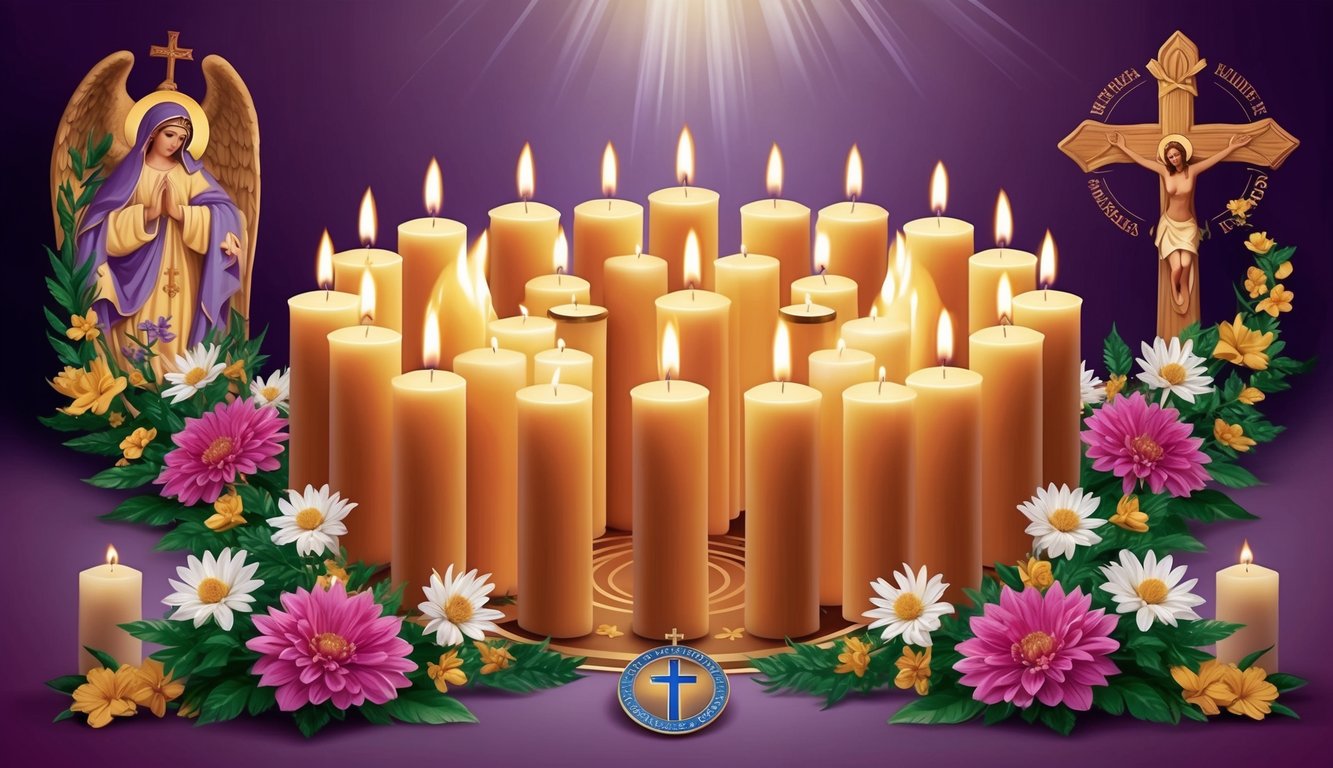Don’t Miss Out On This Unique Astrological Opportunity
Are you tired of spinning your wheels and getting nowhere? Simply put, you’re out of sync: you’re out of alignment with your astral configuration.
But: there’s a kind of map that can help you reclaim your alignment. Think of it as your own personal blueprint to success and happiness: a blueprint that will help you live your most amazing life.
Get started here.
Praying for the faithful departed is a time-honored tradition in the Catholic Church, and the novena for the faithful departed holds an important place in this practice.
A novena is a series of prayers typically recited over nine days, usually to ask for divine intervention or to commemorate a particular aspect of faith. By engaging in the novena for the faithful departed, you offer prayers aimed at interceding for loved ones who have passed away, seeking spiritual benefits for their souls.
This act of devotion not only shows your love and remembrance but also aligns your actions with the Church’s teachings on purgatory and afterlife.
The structure of the novena involves specific prayers and intentions that guide you through reflections on life, death, and spiritual support for those who have left this world.
Each day can be seen as a step closer to expressing your love and faith, while promoting spiritual growth both for you and the departed.
By participating in the novena, you connect with a community of believers who share in this journey of remembrance and hope for eternal peace.
Through this practice, you embrace the belief that your prayers hold the power to affect change, both for the departed and for yourself.
The impact of the novena is profound, offering solace, comfort, and a deeper understanding of the bond between the living and those who have gone before.
Understanding Novenas and Their Purpose

Novenas are special prayers repeated over nine days.
They are deeply rooted in tradition and hold significant importance in various spiritual practices.
This section explores the origin of novenas and the purpose of the novena for the faithful departed.
The Origin and Tradition of Novenas
Novenas have a long history within Christian traditions.
Their name comes from the Latin word for nine, “novem.” This tradition started in biblical times and was formalized by the early Christians.
Originally, novenas were prayers for repentance, worship, and petitions.
These prayers could be made alone or within a community, and they often ask for divine help or intervention.
The oldest novena is the Novena to the Holy Spirit, rooted in the days between the Ascension of Christ and Pentecost.
The practice involves expressing your deepest needs and desires to the lord through persistent supplications.
Specifics of the Novena for the Faithful Departed
This particular novena holds a special place for those who have passed away.
Its prayers seek eternal rest for the holy souls in purgatory.
During these nine days, you ask for divine mercy and peace for those who have departed, offering prayers to ease their journey to eternal life with the lord.
Typically, prayers are coupled with intentions to help loved ones find peace and find comfort in the belief of a compassionate deity.
These prayers can bring solace and hope, strengthening your connection with those who have moved on.
The Structure and Content of the Novena
The Novena for the Faithful Departed is a series of prayers offered over nine days, focusing on the souls of those who have passed away.
These prayers aim to offer comfort and assistance in the spiritual journey of the deceased.
Each day includes specific prayers and reflections.
Components of Daily Prayer
Each day’s prayer usually includes the Our Father, Hail Mary, and Glory Be.
These are followed by a special novena prayer for the dead.
This prayer often reflects on the Passion of Jesus, asking for peace and mercy on the souls of the departed.
In addition to these prayers, some novenas incorporate the Litany for the Faithful Departed.
This litany invokes the assistance of saints, including St. Michael and St. Joseph, to intercede for the souls in purgatory.
Each component is chosen to encourage reflection on faith and the eternal rest of those who have died.
Significance of the Prayers Offered
The prayers offered in the novena hold deep significance, aiming to support the souls of the departed.
By reciting these prayers, you ask for mercy and eternal rest for loved ones.
Specific invocations of the Blessed Virgin Mary play a crucial role as she is often seen as the compassionate intercessor.
The novena’s prayers are a testament to the belief in the communion of saints and the power of intercession.
They serve as a reminder of the bond between the living and the dead and the hope for eternal life.
The Novena to the Immaculate Conception is a profound expression of this devotion, seeking Mary’s intercession for grace and purity.
Through this novena, the faithful reflect on her role in salvation history and ask for her guidance in their spiritual journey.
It reinforces the belief that her prayers can lead souls closer to God and bring comfort in times of need.
Invocations to Saints and the Holy
Each day of the novena also includes invocations to saints who are known for their guidance and protection.
St. Michael is often called upon to defend the souls of the departed, while St. Joseph, the patron of a happy death, provides comfort and guidance.
The invocation also extends to the Holy Trinity, asking for divine mercy.
By seeking the intercession of saints and the holy, the prayers emphasize a supportive spiritual network.
This pillar of the novena encourages trust in divine compassion and highlights the belief that saints will aid those who have passed.
Theological Insights on Purgatory and Afterlife

When exploring the concepts of purgatory and the afterlife, several key themes come into play.
These include the doctrine of purgatory in Catholicism and the practice of intercession for the souls in purgatory through prayer and novenas.
Doctrine of Purgatory in Catholicism
In Catholic teaching, purgatory is understood as a state where souls undergo purification before entering heaven.
It is not a place of punishment but rather a process of spiritual cleansing.
The idea is that souls not yet free of minor sins or temporal punishment need purification to achieve the holiness necessary for eternal life with God.
This belief is rooted in tradition and scripture, reflecting God’s mercy and justice.
Purgatory underscores the church’s teaching on the communion of saints, connecting those on earth with those who have passed on.
The day of judgment will ultimately lead to the holy resurrection, where the purified souls join the rest peacefully.
Intercession for the Souls in Purgatory
Catholics often pray for the souls in purgatory, asking for God’s mercy on them.
This practice is deeply rooted in the tradition of intercession, where the living can aid the deceased through prayer and good works.
A common practice is the novena for the faithful departed, a series of prayers said over nine days.
Such intercessions are seen as acts of charity and hope.
They aim to help the souls reach heaven more swiftly.
Believers trust in the mercy of God to welcome these souls with compassion and grace.
This practice also strengthens the spiritual connection between the living and the dead, reflecting the eternal bond within the faith community.
The Impact of the Novena on the Living and the Departed
When you pray the novena for the faithful departed, it not only brings comfort to the souls in purgatory but also offers spiritual growth for those who participate.
This section explores the spiritual benefits experienced by participants and the granting of mercy to the departed.
Spiritual Benefits for the Participants
Praying a novena can strengthen your faith and deepen your spiritual connection.
By consistently dedicating time for prayer, you develop discipline and focus.
Engaging in a novena often provides hope and comfort, knowing you are supporting the departed with your prayers.
This practice can result in personal growth and reflection, leading to a more compassionate outlook on life.
Additionally, reciting final prayers for the departed allows you to reflect on mortality and the belief in eternal happiness.
Granting Mercy to the Departed
The novena for the dead is believed to bring mercy and relief to souls in purgatory.
Your prayers can help in reducing their suffering and bringing them closer to eternal happiness.
According to tradition, this act of devotion offers the departed a chance for purification, as your prayers intercede on their behalf.
By praying for the dead, you contribute to their spiritual journey, potentially guiding them away from hell and towards peace.
Offering mercy on the soul of the faithful departed is a powerful expression of love and compassion, helping them achieve rest and solace.
Frequently Asked Questions

A novena for the faithful departed is a special nine-day prayer dedicated to the souls of the deceased.
This section will address common questions about the structure, initiation, and prayers involved in this meaningful practice.
What is the traditional structure of a 9-day novena for the faithful departed?
A traditional novena consists of specific prayers recited over nine consecutive days.
Each day may feature different intentions, focusing on the soul’s peace and eternal rest.
This involves daily set prayers, often including the Rosary and specific invocations tailored to the departed.
How can one initiate a novena for someone who has recently passed away?
To start a novena for someone who has passed, choose a quiet time and place to begin the prayers.
It’s common to start shortly after the person’s death, but you can begin anytime.
Consistency over the nine days helps maintain the focus and intention of the prayer.
Are there specific prayers to include each day during a novena for the dead?
Yes, many people choose set prayers for each day.
Traditional prayers might include the Rosary, specific novena prayers, and the eternal rest prayer.
Some novenas also include readings from Scripture or reflections about the deceased.
You can find more details in Catholic prayer books or online resources.
Is it possible to obtain a novena prayer in English for the faithful departed?
English versions of novena prayers are widely available.
You can find them in Catholic prayer books, churches, and numerous online resources.
They often include both the standard set of prayers and specific language tailored to customs and needs.
What is the purpose of performing a novena for the souls of the deceased?
The purpose of a novena for the departed is to offer prayers for their souls, seeking mercy and eternal peace.
It’s a way for the living to express love and remembrance while asking God to welcome the deceased into His presence.
Can the novena for the faithful departed be adapted for group prayer sessions?
Yes, group sessions are a common and impactful way to perform a novena.
Gatherings at homes or churches allow participants to pray together, enhancing the sense of community and shared intention.
Adaptations might involve assigning different prayers to individuals or adding hymns.



